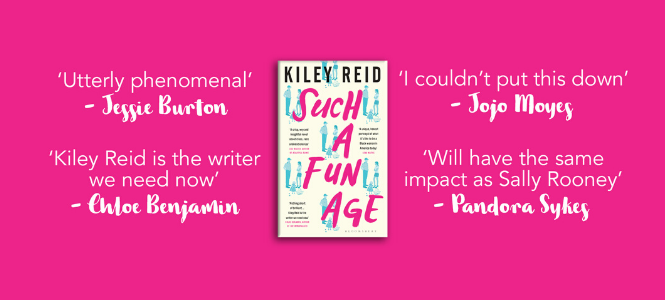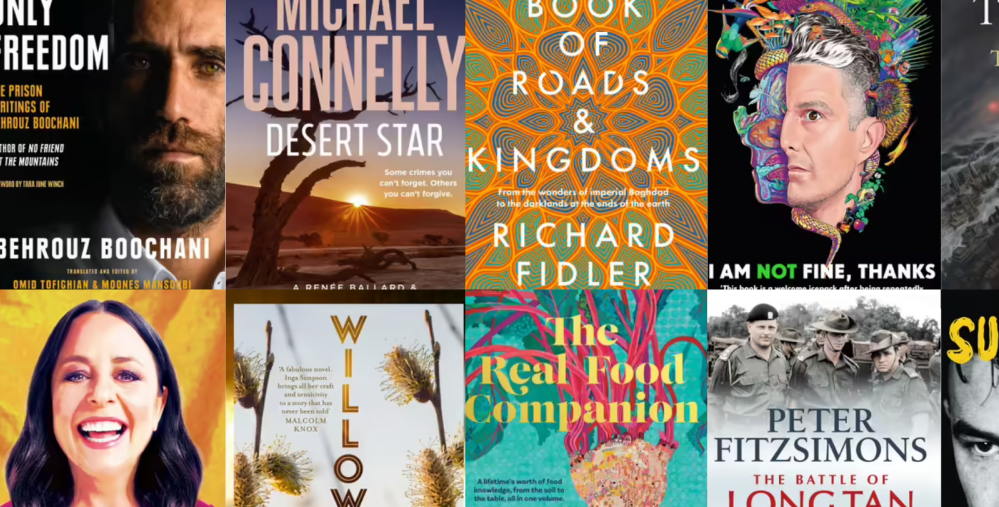Kiley Reid is a recent graduate of the Iowa Writers’ Workshop where she was the recipient of the Truman Capote Fellowship. She lives in Philadelphia, Pennsylvania. Such A Fun Age, a recent Reese Witherspoon Book Club pick, is her first novel.
We asked Kiley a few questions about her debut novel, her approach to writing, and which books are on her TBR pile right now. Read on!
Tell us about your book, Such a Fun Age!
KR: Such A Fun Age starts on a Saturday night in September in 2015. Emira Tucker is a recent college graduate, a bit broke and aimless, and she’s out with her friends. Alix Chamberlain, the mother she babysits for, calls and asks her to babysit as the Chamberlain family has had an emergency. Emira takes three-year-old Briar to an upscale grocery store and they’re dancing, having fun, until a customer and security guard, upon seeing a black woman with a white child, accuse her of stealing the child. Alix sets out to right the night’s wrongs. But the story turns into a comedy of good intentions as Emira and Alix learn they have something in common.
This novel is based in part on your own time spent as a babysitter, but you’ve also been quite clear that Emira’s experiences are not your own. Do you find that it’s easier to write from a place of personal knowledge or does that present its own difficulties?
KR: The great thing about being a writer is the natural inspiration that comes from different jobs, experiences, and seasons of life. I’m always grateful to have experienced something first hand, like the feeling of working in someone else’s home, but I also enjoy the challenge of researching something more foreign and making that world as accurate as I can. All in all, I’m not sure which is easier, but after six years as a nanny I was definitely appreciative of the environmental details I took from my time working with different families.
Such a Fun Age is narrated by both Emira and Alix. How did you go about balancing their parts of the novel – did you write both characters’ stories separately and then bring them together, or did you alternate writing their chapters?
KR: It was definitely a balancing act that sometimes toppled too far to one side and had to be brought back to the other. I wrote alternating chapters, but this often meant writing a scene, and quickly learning that it would serve the story much more to tell it from the other character’s perspective. The Thanksgiving scene was definitely a challenge and many pages were scrapped but I’m happy to now see those deleted scenes as a necessary part of the process.
Do you see Alix and Emira as polar opposites in terms of privilege, race, wealth and so on, or do you feel like they’re more in conversation with each other?
KR: Alix and Emira have such different financial backgrounds that I almost find it fruitless for me to compare them as I might flatten the nuance of both. Alix grew up middle class and white until a massive change in her teens, one that was confusing and put her in a new social class, as well as altered her relationship with her parents. Emira grew up lower middle class and black and was the first college graduate in her family, and she often blames herself for not finding financial stability as an adult when the systems around her were not built to help her succeed. As a writer and as a person I find it more helpful to keep an even hand and remind myself that I want the same things for Alix and Emira: a healthy, home, a job that makes them feel like they’re part of the community, a liveable wage, and healthcare.
The characters in your novel are fascinating – like in real life, they aren’t wholly good or bad people, but the ways in which they react to certain situations is very telling. Can you talk a little bit about your approach to writing character?
KR: I love whole characters that have wonderful qualities and still make bad choices, and I see most of us are quite similar. I make sure to give every character a win at some point, and show their strengths as a person. But I also don’t protect my characters or my readers. Harmful actions can come out of good intentions and I think it’s the writer’s job to show the complexity of this mixture of intent and impact.
Read our review of Such a Fun Age!
Such a Fun Age also explores this interesting idea of how paid work can cross over into emotional labour, particularly when it comes to babysitting and the bond between sitter and child. Was this intentional or was it something that emerged from the story as you were writing it?
KR: I’ve always been fascinated by domestic labour and emotional labour, and I think that the quality of domestic work often comes hand in hand with the latter. Being with children can be so emotional, they can be so wonderful and charming and emotional themselves. Sometimes it’s quite hard to separate yourself from the work when the work is quite literally attaching itself to you with hugs or kisses. It was definitely intentional to keep Emira’s finances and her growing relationship to Briar at the forefront, as they may seem conflicting but I think they come hand in hand.
How do you approach a new piece of writing? For instance, do you begin with character, plot or setting? Where does your inspiration come from?
KR: I always start with characters. I have to like the people I’m writing about, and by like, I mean I find them interesting and real. And I can get inspired by just about anything. Dialogue always inspires me. If I hear something interesting on the train or at a restaurant, I’ll email the line to myself immediately. And I’m always inspired by books I read, movies I watch, trying new things, and exploring new places.
Who do you most admire in the writing world?
KR: There are so many, but James Baldwin sticks out as he has reserves of bravery that I could only wish for. Last year I read his essay “Everybody’s Protest Novel” from Notes Of A Native Son and I was floored by his honesty, his unflinching standards for art, his sentences … I could go on.
Which books do you have on your TBR pile right now?
KR: Right now it’s Bryan Washington’s Memorial, Nathan J. Robinson’s Why You Should Be A Socialist (published in Australia as We’re All Socialists Now), and an old New Yorker as there’s a George Saunders short story in it that I want to read.
What do you hope readers will discover in Such A Fun Age?
KR: First and foremost, I hope they find the story gripping and propulsive with characters that surprise them but are also familiar. It might sound trite, but I love feeling as though I’ve discovered myself in a story, whether the text reveals my better or lesser traits. And lastly I hope readers will discover that they’ve been reading for much longer than they’ve intended, and that for a moment, they completely forgot themselves.
And finally, what’s up next for you?
KR: For now, the big goal is to stay healthy and at home. I’m onto novel number two, barely, which means lots of research and reading. And I’m thrilled to continue working on the film adaptation of Such A Fun Age.
Thanks Kiley!
You’re so welcome!
—Such a Fun Age by Kiley Reid (Bloomsbury Australia) is out now. Find out more about Kiley here.

Such a Fun Age
When Emira is apprehended at a supermarket for 'kidnapping' the white child she's actually babysitting, it sets off an explosive chain of events. Her employer Alix, a feminist blogger with a 'personal brand' and the best of intentions, resolves to make things right.
But Emira herself is aimless, broke and wary of Alix's desire to help. When she meets someone from Alix's past, the two women find themselves on a crash course that will upend everything they think they know – about themselves, each other, and the messy dynamics of privilege...







 Booktopia’s top picks for Mother’s Day 2023
Booktopia’s top picks for Mother’s Day 2023  Top 10 book deals for Black Friday!
Top 10 book deals for Black Friday!  Top 10 Books for Dad this Christmas!
Top 10 Books for Dad this Christmas!
Comments
No comments